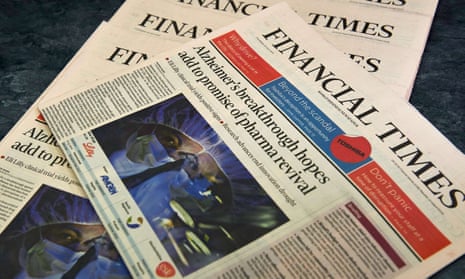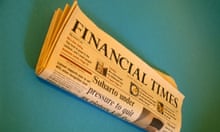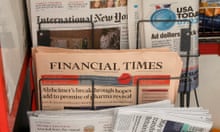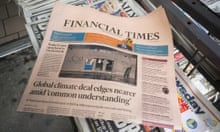Pearson was no longer the best owner of the Financial Times, the publishing group’s chief executive has said in defence of the decision to sell the 127-year-old newspaper to Japan’s Nikkei.
John Fallon gave assurances that the Japanese financial media company would respect the FT’s independence, ensuring that the title would remain “a great British institution”.
He told BBC Radio 4’s Today programme on Friday: “In many ways it’s the leading chronicler of global business and this is another great example of global business in action.”
Fallon said that in its 58 years of owning the publication, Pearson had a “completely hands-off approach to the editorial freedom”.
“I spent extensive time with Nikkei management and discussing this with senior colleagues at the Financial Times and I have every reason and every confidence to believe that Nikkei will take exactly the same approach. They’ve been in the business of journalism for a long time, they are hugely admiring of the Financial Times. Their culture is huge respect for the integrity and quality of their journalism. They very much take a world view, as does the Financial Times.”
Fallon said Nikkei, which beat Germany’s Axel Springer in a bidding competition for the paper, was one of the few companies that would maintain the FT’s editorial independence. “If you look around the world, having made the decision that Pearson was no longer the best owner of the Financial Times I would say that Nikkei is one of the very few organisations with whom you would say that you would feel that they would continue in the long and honourable tradition of editorial independence without fear and favour and a completely global perspective on the world.”
However, Michael Woodford, the corporate whistleblower who exposed a $1.7bn fraud inside the Japanese group Olympus, told the Times he was “cynical and deeply troubled” about the deal because Nikkei is “known as the corporate voice piece of Japan”.
Asked why his firm decided to sell, Fallon said Pearson was the world’s biggest educational publishing company. “Education and journalism are both very important activities to society, but it comes increasingly hard to ride both horses equally well.” He pointed to the growth in mobile and social media and increasing number of people accessing news through social media while on the go.
The FT contributed less than £25m to Pearson’s annual profits of around £800m, Fallon said.
According to reports in the FT from a press conference in Tokyo on Friday, Nikkei president Tsuneo Kita said the company would maintain the paper’s independence while investing in the brand.
“Let us be clear that the editorial independence will be maintained. The FT is going to be the FT — it remains unchanged,” said Kita.
“We should not compromise their brand value as we will continue to grow their brand.”
Meanwhile, Pearson said in first half results on Friday morning that the FT had increased paid circulation by 9% year on year to 737,000 in the first six months of 2015, driven by a 14% rise in in digital subscribers to 520,000.
Revenues at FT group grew “slightly” during the first half of the year, as digital sales offset declines in print, and growth in North America made up for declines in Europe. Digital subscribers now account for 70% of the FT’s readership.
In March the FT scrapped metered access, which allowed online readers to view about 10 articles for free a month, and shifted to a system of cheap month-long trial periods.
Pearson said its investment in new products was increasing reader engagement, with its FirstFT morning newsletter increasing visits from subscribers by a quarter.
Thursday’s deal with Nikkei does not include Pearson’s 50% stake in the Economist, which is part of FT Group. Pearson said the Economist’s contribution to revenues increased during the first half of 2015 as rises in circulation, custom research and marketing services revenues offset declines in print advertising.
Total circulation at the Economist now stands at 1.6m, with 57% more subscribers opting for packages that include digital access during the first half of 2015.
Total sales at Pearson, which generates most of its revenues from education services, were up 1% to £2.2bn, as growth in North America, Brazil and China offset declines in textbook sales in North America. However, operating profit fell 4% to £72m.





